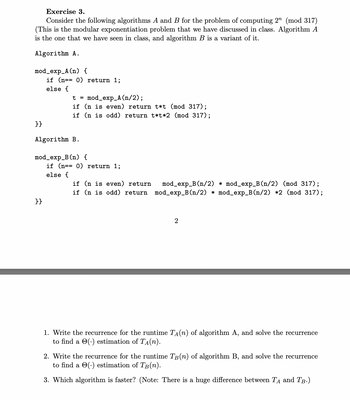
Database System Concepts
7th Edition
ISBN: 9780078022159
Author: Abraham Silberschatz Professor, Henry F. Korth, S. Sudarshan
Publisher: McGraw-Hill Education
expand_more
expand_more
format_list_bulleted
Concept explainers
Question

Transcribed Image Text:**Exercise 3.**
Consider the following algorithms A and B for the problem of computing \(2^n \mod 317\). (This is the modular exponentiation problem that we have discussed in class. Algorithm A is the one that we have seen in class, and algorithm B is a variant of it.)
**Algorithm A.**
```plaintext
mod_exp_A(n) {
if (n == 0) return 1;
else {
t = mod_exp_A(n/2);
if (n is even) return t * t (mod 317);
if (n is odd) return t * t * 2 (mod 317);
}
}
```
**Algorithm B.**
```plaintext
mod_exp_B(n) {
if (n == 0) return 1;
else {
if (n is even) return mod_exp_B(n/2) * mod_exp_B(n/2) (mod 317);
if (n is odd) return mod_exp_B(n/2) * mod_exp_B(n/2) * 2 (mod 317);
}
}
```
1. Write the recurrence for the runtime \( T_A(n) \) of algorithm A, and solve the recurrence to find a \(\Theta(\cdot)\) estimation of \( T_A(n) \).
2. Write the recurrence for the runtime \( T_B(n) \) of algorithm B, and solve the recurrence to find a \(\Theta(\cdot)\) estimation of \( T_B(n) \).
3. Which algorithm is faster? (Note: There is a huge difference between \( T_A \) and \( T_B \).)
Expert Solution
This question has been solved!
Explore an expertly crafted, step-by-step solution for a thorough understanding of key concepts.
This is a popular solution
Trending nowThis is a popular solution!
Step by stepSolved in 3 steps

Knowledge Booster
Learn more about
Need a deep-dive on the concept behind this application? Look no further. Learn more about this topic, computer-science and related others by exploring similar questions and additional content below.Similar questions
- Using recursion, write a Python function def before(k,A) which takes an integer k and an array A of integers as inputs and returns a new array consisting of all the integers in A which come before the last occurrence of k in A, in the same order they are in A. For example, if A is [1,2,3,6,7,2,3,4] then before(3,A) will return [1,2,3,6,7,2]. If k does not occur in A, the function should return None.arrow_forwardConsider a recursive function, called f, that computes powers of 3 using only the + operator. Assume n > = 0. int f(int n) { if (n == 0) return 1; return f(n-1) + f(n-1) + f(n-1); } Give an optimized version of f, called g, where we save the result of the recursive call to a temporary variable t, then return t+t+t. i got int g(int n) { if (n == 0) return 1; int t = g(n - 1); return t+t+t; } so now Write a recurrence relation for T(n), the number addition operations performed by g(n) in terms of n.arrow_forwardGive a recursive definition for the set of all strings of a’s and b’s that begins with an a and ends in a b. Say, S = { ab, aab, abb, aaab, aabb, abbb, abab..} Let S be the set of all strings of a’s and b’s that begins with a and ends in a b. The recursive definition is as follows – Base:... Recursion: If u ∈ S, then... Restriction: There are no elements of S other than those obtained from the base and recursion of S.arrow_forward
- Question 4arrow_forwardwrite java codes to do the following: Write a recursive function to check if an integer array is negative symmetric, for example, an array of 10, 20, 30, 90, -30, -20, -10 is considered as negative symmetric, while an array of 10, 20, 30, 90, 30, 20, 10 is not considered as negative symmetric. public static boolean checkArraySym(int [ ] A, int first, int last) that receives an array A, first index, last index and checks if the array is negative symmetricarrow_forward
arrow_back_ios
arrow_forward_ios
Recommended textbooks for you
 Database System ConceptsComputer ScienceISBN:9780078022159Author:Abraham Silberschatz Professor, Henry F. Korth, S. SudarshanPublisher:McGraw-Hill Education
Database System ConceptsComputer ScienceISBN:9780078022159Author:Abraham Silberschatz Professor, Henry F. Korth, S. SudarshanPublisher:McGraw-Hill Education Starting Out with Python (4th Edition)Computer ScienceISBN:9780134444321Author:Tony GaddisPublisher:PEARSON
Starting Out with Python (4th Edition)Computer ScienceISBN:9780134444321Author:Tony GaddisPublisher:PEARSON Digital Fundamentals (11th Edition)Computer ScienceISBN:9780132737968Author:Thomas L. FloydPublisher:PEARSON
Digital Fundamentals (11th Edition)Computer ScienceISBN:9780132737968Author:Thomas L. FloydPublisher:PEARSON C How to Program (8th Edition)Computer ScienceISBN:9780133976892Author:Paul J. Deitel, Harvey DeitelPublisher:PEARSON
C How to Program (8th Edition)Computer ScienceISBN:9780133976892Author:Paul J. Deitel, Harvey DeitelPublisher:PEARSON Database Systems: Design, Implementation, & Manag...Computer ScienceISBN:9781337627900Author:Carlos Coronel, Steven MorrisPublisher:Cengage Learning
Database Systems: Design, Implementation, & Manag...Computer ScienceISBN:9781337627900Author:Carlos Coronel, Steven MorrisPublisher:Cengage Learning Programmable Logic ControllersComputer ScienceISBN:9780073373843Author:Frank D. PetruzellaPublisher:McGraw-Hill Education
Programmable Logic ControllersComputer ScienceISBN:9780073373843Author:Frank D. PetruzellaPublisher:McGraw-Hill Education

Database System Concepts
Computer Science
ISBN:9780078022159
Author:Abraham Silberschatz Professor, Henry F. Korth, S. Sudarshan
Publisher:McGraw-Hill Education

Starting Out with Python (4th Edition)
Computer Science
ISBN:9780134444321
Author:Tony Gaddis
Publisher:PEARSON

Digital Fundamentals (11th Edition)
Computer Science
ISBN:9780132737968
Author:Thomas L. Floyd
Publisher:PEARSON

C How to Program (8th Edition)
Computer Science
ISBN:9780133976892
Author:Paul J. Deitel, Harvey Deitel
Publisher:PEARSON

Database Systems: Design, Implementation, & Manag...
Computer Science
ISBN:9781337627900
Author:Carlos Coronel, Steven Morris
Publisher:Cengage Learning

Programmable Logic Controllers
Computer Science
ISBN:9780073373843
Author:Frank D. Petruzella
Publisher:McGraw-Hill Education